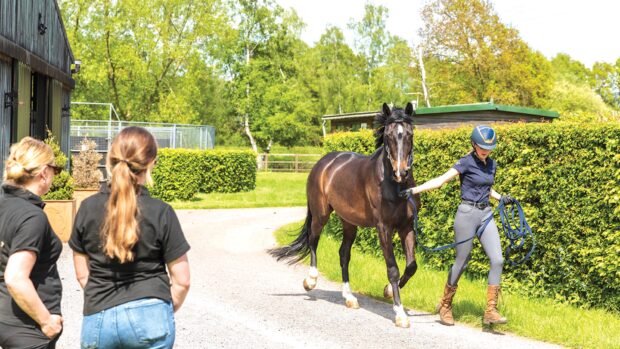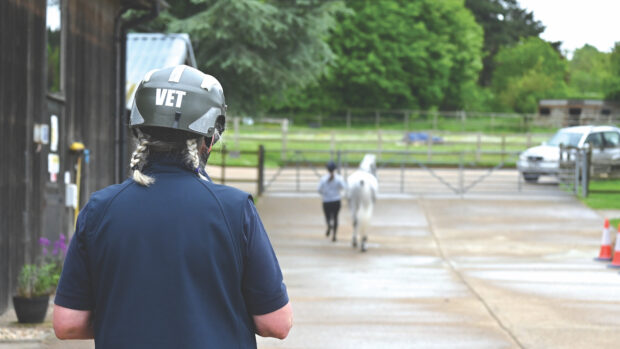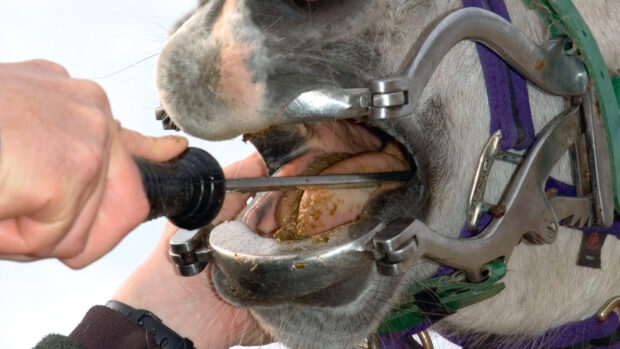Rebecca Hewitt, an equine law specialist with solicitors Darbys in Oxford, says that disputes between buyers and sellers are a major area of growth.
“Many disputes arise following sale or purchase of a horse,” she says. “The law involved is often the Sale of Goods Act and misrepresentation.
“Claims like this are probably increasing due to greater awareness of rights, access to the courts and publicity. One problem in the equestrian industry is unwillingness to record contractual relationships in writing, which leads to disputes based on one person’s word against another’s.”
If a buyer is unhappy, it is often the vet who gets caught in the middle. So what are the potential risks when vetting horses?
The main risk is a claim for negligence, Rebecca says. “Vets are also subject to professional regulation by the Royal College of Veterinary Surgeons (RCVS).”
The Veterinary Defence Society, the body that advises vets in legal disputes, says every case brought to its attention is investigated.
Rod Fisher MRCVS, an equine specialist and senior partner at the Abbey Equine Centre in Crickhowell, says vets are under increasing pressure from clients when they are conducting a pre-purchase examination, because the expectation is unrealistic.
“You make your clinical judgement on one day, but more and more people are seeing a vetting as insurance for life,” he adds.
Meticulous analysis
But does this mean fewer horses actually pass? Vets say their clinical judgment is unimpaired in the face of pressure, and there are few statistics to suggest otherwise.
Tavistock-based vet Dr Kieran O’Brien, of the EqWest practice, says sometimes the perception is different to the reality.
“The perception is that we are more careful because we live in a litigious age, but the requirement to do the examination in a meticulous, professional way, upholding the standards expected, has not altered in the last 25 years,” he says.
“When someone said to me, ‘you fail everything’, I conducted my own survey on 50 successive horses, and 77 per cent ended up being purchased, which was significantly higher than when I first qualified.
“As you gain experience and confidence, you are more able to understand and explain the shades of grey to a client. With less experienced vets, things tend to be more black and white and they are more rigid in their approach.”
One Oxfordshire horse-owner admits that a string of failed vettings led her to buy a horse without having it inspected by a vet. “Of the horses that I have had pass vettings, two later proved unsuitable,” she explains. “I then had a run of horses fail vettings, all for good reasons.
“I concluded that the kind of horse I was looking for, that had ‘been there and done that’, would be likely to have had a few knocks, so I took the risk. I bought from a reputable breeder, whose vet confirmed the owner’s story as far as treatment by his practice was concerned.”
However, things have not turned out so happily for former dealer Paul Thorpe, who has shut up shop, saying he has gone out of business because whereas five years ago, nine out of 10 of his imported Irish horses passed the vet, now just one out of 10 is successful.
“Vets are not passing horses as they used to,” Paul says. “We live in a blame culture and, to a degree, the vets have my sympathy.
“The buyer probably needs to take more responsibility and the whole industry must consider how you can have a horse vetted without exposing vets to possible litigation. Vets also need to have more consideration for the job the horse will do, not to say that a horse that is 22, and will be for a lady who barely wants it to break out of a walk, has to pass a five-stage vetting and be super-fit.”
Risk Assessment
In the sphere of competition horses, Rod Fisher says it is much easier looking at horses for established clients. “You are then in a position to know exactly what they are looking for and the job they want it to do,” he says.
Dr Kieran O’Brien adds that he tells his clients that he is “in the business of risk assessment. I will assess a horse as being a high-risk or a low-risk animal, but I do not say it is a no-risk animal”.
From an insurer’s point of view, Guy Prest’s key concern is the rare occasion when a vet is prepared to gloss over potential problems that have arisen during an examination, so that the client can still obtain cover. Inevitably the burden of such disputes will pass to the horse-owning public.
“The worst scenario is a vet providing a detailed certificate for the client and an edited version for the insurer,” he says.
In the most serious cases, false certification is a striking-off offence, says the RCVS.
Only two such cases have been brought in recent years – one in 2003 due to false certification, and another in 2002, arising from a case of misrepresentation.
“Allegations of negligence are usually resolved between the parties or civil courts and are generally not a matter for the RCVS,” says a spokesman. “We don’t generally strike people off for negligence. On occasions when the alleged negligence is so serious as to be an issue of professional conduct, the RCVS will investigate.”
The vetting procedure was debated at the recent annual British Equine Veterinary Association (BEVA) Congress, with proposals for a change to the present certificate, which presently requires a simple ‘yes or no’ statement from the vet, to give way to a more balanced weighing-up of the issues.
There are also plans for a new warranty system – requiring vendors to provide more information about their animals – which will carry legal weight and give purchasers some redress when things go wrong. BEVA has also just produced an aide memoir for vets embarking on a pre-purchase examination.
No Grey Areas
Dr O’Brien says the days of the black and white form, with no room for grey areas giving a more balanced view, are numbered. He welcomes the widespread introduction of a warranty system, which has been in place at his practice for a number of years.
The warranty asks 10 questions of the seller, including certifying that the animal is drug-free.
Dr O’Brien says the form has helped three purchasers get horses – two headshakers and one with sweet itch, all sold during the winter when their conditions were not apparent – returned to vendors who had failed to disclose the information.
“The majority of horses are sold privately and so are not covered by the Sale of Goods Act,” he says.
“Often potential purchasers just don’t know the right questions to ask, so vets can help them. Enforcing the warranty can be difficult, but signing a declaration like this certainly focuses the vendor’s mind and that can only help make the process of buying a horse more straightforward.”
The vetting
The Five Stage Veterinary Examination for Purchase is carried out along guidelines laid down by the RCVS in conjunction with the British Veterinary Association (BVA) and the BEVA.
The examination should be carried out by an experienced vet, who will report on whether it is advisable to go ahead with the purchase. BEVA advises that you should try to use your own vet, who will appreciate and advise on your requirements.
Having a horse examined before purchase is not cheap but it may well save you money in the long run, says the BEVA. If the horse passes the examination a certificate will be completed by the vet, which may be used for insuring the horse or pony when the sale is completed.
When a purchaser asks a vet to examine a horse there is a contract between them.
The vet is under a professional duty to carry out his/her assessment of the horse to a reasonable standard. If the vet falls below a reasonable standard, and the purchaser suffers loss as a result of that, then the vet may be subject to a claim. The client will have to show that the vet acted in such a way as no other body of veterinary professional opinion would do, or that the vet failed to act in an appropriate way.
The test is similar to that for doctors in medical negligence claims. Many cases will require expert evidence to support allegations of negligence, and evidence will also be required from a vet with the same or equivalent qualifications to the vet in question. But even if you are successful in proving negligence, you also have to prove that the negligent act or acts led directly to the loss/damage suffered.
- This news feature was first published in HORSE magazine (October ‘04)



